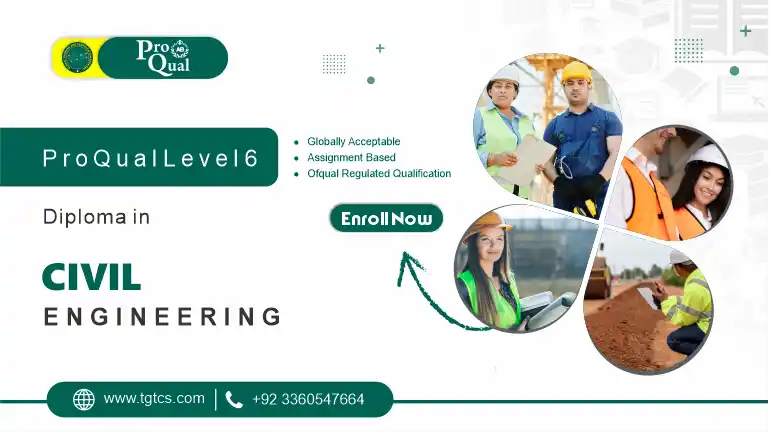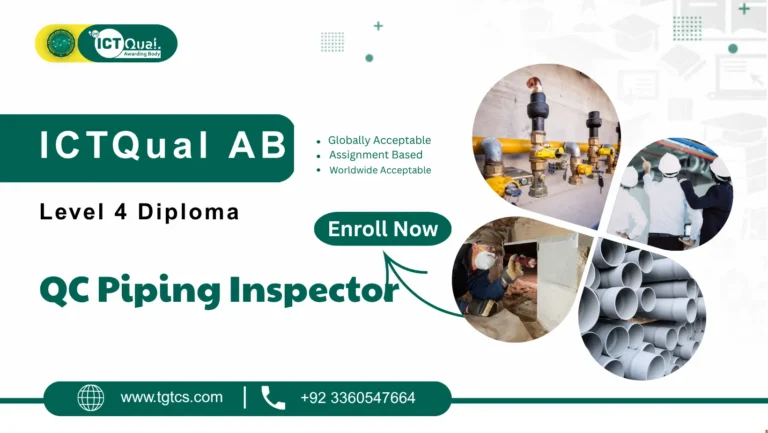ICTQual Level 6 Diploma in Mechanical Engineering 360 Credits – Three Years
The ICTQual Level 6 Diploma in Mechanical Engineering (360 Credits) is a comprehensive, three-year program designed to provide you with the advanced skills, knowledge, and practical experience needed to excel in the dynamic field of mechanical engineering. This qualification prepares you for a wide range of career opportunities in industries such as manufacturing, automotive, aerospace, and energy.
The ICTQual Level 6 Diploma in Mechanical Engineering is an advanced qualification that offers a deep dive into mechanical engineering principles and practices. With a curriculum that covers topics such as thermodynamics, fluid mechanics, materials science, and mechanical design, this diploma is ideal for individuals who want to gain specialized knowledge and technical expertise.
The ICTQual Level 6 Diploma in Mechanical Engineering is a gateway to exciting and lucrative career opportunities in the mechanical engineering industry. With a robust curriculum, hands-on learning, and excellent career prospects, this qualification sets you on the path to success. Whether you’re looking to enter the workforce directly or pursue further education, the ICTQual Level 6 Diploma in Mechanical Engineering provides the knowledge, skills, and credentials you need to excel.
The Global Training and Certification Services (TGTCS) is Directly Approved Training Centre of ICTQual
The ICTQual Level 6 Diploma in Mechanical Engineering (360 Credits) is a comprehensive three-year program designed to provide students with advanced knowledge and practical skills in mechanical engineering. This qualification equips learners with expertise in key areas such as mechanical design, thermodynamics, fluid mechanics, materials science, manufacturing processes, and project management. The curriculum combines theoretical learning with hands-on experience, preparing graduates for high-level roles in industries such as automotive, aerospace, energy, and manufacturing.
Throughout the course, students develop a deep understanding of engineering principles, gain proficiency in modern engineering tools like CAD and simulations, and learn how to tackle real-world challenges. Upon completion, graduates are well-prepared to pursue careers as mechanical engineers, design engineers, project managers, or quality control specialists. Additionally, they have the option to further their studies or pursue professional certifications, enhancing their career prospects in a growing and dynamic industry.
Mandatory Units
The Units of Level 6 Diploma in Mechanical Engineering 360 Credits – Three Years are as :
Year 1: Foundation and Core Engineering Principles
- Mathematics for Engineering
- Engineering Principles
- Materials Science and Engineering
- Engineering Drawing and CAD
- Statics and Dynamics
- Introduction to Thermodynamics
- Manufacturing Processes
- Fluid Mechanics
- Electrical and Electronic Systems for Engineers
- Engineering Mathematics for Design
- Mechanical Design Fundamentals
- Engineering Project Management
Year 2: Advanced Engineering Concepts and Applications
- Advanced Thermodynamics
- Strength of Materials
- Heat Transfer and Fluid Dynamics
- Advanced Manufacturing Techniques
- Mechanical Vibrations and Acoustics
- Engineering Dynamics and Control
- Design and Analysis of Machine Elements
- Control Systems for Mechanical Engineering
- Engineering Materials and Failure Analysis
- Computer-Aided Engineering (CAE)
- Mechanical System Design
- Project Planning and Cost Estimation
Year 3: Specialization and Practical Application
- Advanced Mechanical System Design
- Energy Systems and Sustainability
- Advanced CAD and 3D Modeling
- Finite Element Analysis (FEA) for Mechanical Engineers
- Advanced Manufacturing and Robotics
- Mechatronics and Automation
- Engineering Research Methodology
- Industrial Engineering and Process Optimization
- Design for Manufacturability
- Professional Practice in Mechanical Engineering
- Engineering Innovation and Entrepreneurship
- Capstone Project/Thesis
Learning Outcomes for the ICTQual Level 6 Diploma in Mechanical Engineering (360 Credits) – Three Years
Year 1: Foundation and Core Engineering Principles
- Mathematics for Engineering
Master foundational mathematical techniques, including calculus, algebra, and trigonometry, to solve engineering problems. - Engineering Principles
Grasp key engineering concepts such as forces, motion, and energy, laying a strong foundation in mechanics and systems. - Materials Science and Engineering
Understand material properties and behavior, and analyze material selection for various engineering applications. - Engineering Drawing and CAD
Develop skills in creating and interpreting engineering drawings using traditional methods and Computer-Aided Design (CAD) for mechanical system modeling. - Statics and Dynamics
Apply static and dynamic analysis principles to engineering problems, solving for forces and motion in mechanical systems. - Introduction to Thermodynamics
Learn the fundamental laws of thermodynamics and analyze energy transfer and transformation in mechanical systems. - Manufacturing Processes
Explore manufacturing techniques like casting, machining, and welding, and their application in mechanical component production. - Fluid Mechanics
Understand fluid properties and flow behavior, applying fluid mechanics principles to practical engineering problems. - Electrical and Electronic Systems for Engineers
Study basic electrical circuits and systems, and understand how electrical components are integrated into mechanical engineering. - Engineering Mathematics for Design
Apply advanced mathematical methods to design challenges, modeling and analyzing mechanical systems. - Mechanical Design Fundamentals
Learn key design principles, including material selection, stress analysis, and system design for mechanical applications. - Engineering Project Management
Develop project management skills, focusing on planning, risk management, and resource allocation to effectively manage engineering projects.
Year 2: Advanced Engineering Concepts and Applications
- Advanced Thermodynamics
Expand knowledge of thermodynamic cycles, efficiency, and energy systems to analyze and design advanced engineering systems. - Strength of Materials
Analyze material strength and deformation under different loading conditions, applying stress, strain, and material failure concepts. - Heat Transfer and Fluid Dynamics
Explore heat transfer mechanisms and fluid flow, applying these principles to complex engineering problems. - Advanced Manufacturing Techniques
Learn advanced manufacturing methods like CNC machining, additive manufacturing, and robotics, understanding their industrial applications. - Mechanical Vibrations and Acoustics
Study mechanical vibrations, resonance, and acoustics to control noise and vibration in engineering designs. - Engineering Dynamics and Control
Understand dynamic system behavior and apply control theory to stabilize mechanical systems, optimizing performance. - Design and Analysis of Machine Elements
Design and analyze machine components like gears, shafts, and bearings, understanding their performance in mechanical systems. - Control Systems for Mechanical Engineering
Apply control theory to mechanical systems, designing feedback and stability control systems for efficient operations. - Engineering Materials and Failure Analysis
Investigate material failure modes such as fatigue and corrosion, applying failure analysis techniques to improve system reliability. - Computer-Aided Engineering (CAE)
Develop proficiency in CAE tools for simulation and design validation, using Finite Element Analysis (FEA) and Computational Fluid Dynamics (CFD) techniques. - Mechanical System Design
Design and optimize mechanical systems considering factors like performance, safety, and cost, addressing real-world engineering challenges. - Project Planning and Cost Estimation
Learn how to estimate project costs, develop project timelines, and manage resources effectively to ensure successful project delivery.
Year 3: Specialization and Practical Application
- Advanced Mechanical System Design
Apply advanced design techniques to create complex mechanical systems, incorporating optimization methods for improved performance and efficiency. - Energy Systems and Sustainability
Study renewable energy systems and sustainable design practices, designing energy-efficient systems that minimize environmental impact. - Advanced CAD and 3D Modeling
Master advanced CAD software for 3D modeling and simulation of mechanical systems, developing detailed models and prototypes. - Finite Element Analysis (FEA) for Mechanical Engineers
Use FEA to analyze and optimize mechanical structures, solving complex problems related to stress, strain, and deformation. - Advanced Manufacturing and Robotics
Study advanced manufacturing processes and robotic integration, using automation to optimize production systems. - Mechatronics and Automation
Explore the integration of mechanical systems with electronics and control systems to create automated solutions for industrial applications. - Engineering Research Methodology
Develop research skills for engineering problem-solving, conducting experiments, analyzing data, and presenting research findings. - Industrial Engineering and Process Optimization
Apply industrial engineering principles to optimize manufacturing processes, analyzing workflows to improve efficiency and reduce costs. - Design for Manufacturability
Learn how to design mechanical systems with manufacturability in mind, optimizing designs for production ease and cost-effectiveness. - Professional Practice in Mechanical Engineering
Understand the professional and ethical responsibilities of mechanical engineers, navigating industry standards, regulations, and workplace communication. - Engineering Innovation and Entrepreneurship
Explore opportunities for innovation and entrepreneurship in engineering, developing the skills to bring new solutions and products to market. - Capstone Project/Thesis
Apply the knowledge gained throughout the course to complete a comprehensive engineering project or research thesis, demonstrating the ability to solve real-world engineering problems.
Advanced Technical Knowledge
The course provides in-depth knowledge of mechanical engineering principles, including advanced topics in thermodynamics, fluid mechanics, material science, and engineering design. This allows students to develop a strong foundation for a career in mechanical engineering.
Industry-Recognized Qualification
As a Level 6 qualification, this diploma is recognized by industry professionals and academic institutions worldwide, opening doors to a wide range of career opportunities in mechanical engineering.
Comprehensive Skill Development
The curriculum covers a broad range of mechanical engineering disciplines, including design, production, manufacturing, and maintenance of mechanical systems. Students also develop problem-solving, analytical, and project management skills that are highly valued in the industry.
Pathway to Professional Engineering Careers
The course is ideal for those seeking to advance their careers in mechanical engineering or those aiming to become Chartered Engineers (CEng) in the future. It prepares students for roles such as mechanical design engineers, manufacturing engineers, and systems engineers.
Hands-On Practical Experience
The program emphasizes practical applications of engineering principles, with opportunities for students to engage in laboratory work, projects, and case studies. This ensures that students are prepared to apply their knowledge to real-world engineering problems.
Flexibility and Adaptability
The three-year duration allows students to learn at a pace that suits their individual needs, with the flexibility to balance their studies with personal or professional commitments. The course can also be tailored to suit different engineering interests and career goals.
Global Career Opportunities
Mechanical engineering is a universally recognized field, offering graduates the opportunity to work across a wide variety of sectors, including aerospace, automotive, energy, and manufacturing, both in the UK and internationally.
Access to Expert Faculty and Industry Networks
Students have access to experienced instructors with extensive industry backgrounds, offering invaluable insights into current industry trends and technologies. The course also fosters networking opportunities with peers and professionals, enhancing career prospects.
Development of Critical Thinking and Innovation
The course encourages students to think critically and creatively when solving engineering problems. Students are taught to approach challenges with innovative solutions, a crucial skill for driving technological advancements in the field of mechanical engineering.
Foundation for Further Education
For those interested in pursuing further studies, such as a master’s degree or research in mechanical engineering, this Level 6 qualification provides the academic foundation needed for higher-level education.
Accredited by Leading Engineering Bodies
The ICTQual Level 6 Diploma is often accredited by relevant professional engineering bodies, which means the qualification meets industry standards and can contribute towards professional registration, enhancing career advancement potential.
The ideal learner for the ICTQual Level 6 Diploma in Mechanical Engineering is someone who is passionate about engineering and wants to build a successful career in the mechanical engineering sector. Here are the key characteristics of the ideal learner:
- Strong Interest in Engineering
The ideal learner is highly motivated by engineering concepts, particularly in mechanical systems, and has a strong desire to understand how things work. They are enthusiastic about designing, analyzing, and solving engineering problems. - Educational Background in Science or Engineering
The learner typically has a background in subjects such as physics, mathematics, or engineering at a Level 3 qualification (e.g., A-levels or vocational qualifications in engineering). They have the foundational knowledge required to succeed in more advanced engineering concepts. - Problem-Solving Mindset
The ideal learner enjoys challenges and is adept at identifying problems and developing solutions. They have critical thinking skills and the ability to approach technical issues methodically and creatively. - Detail-Oriented and Analytical
The learner should have a keen eye for detail and be capable of analyzing complex data and systems. They should possess strong analytical skills, enabling them to evaluate mechanical systems and suggest improvements. - Self-Motivated and Disciplined
This learner is dedicated and able to manage their time effectively. Since the course spans three years, the ideal candidate should be prepared to commit to a long-term, focused study plan, balancing theoretical learning with practical application. - Career-Oriented
The ideal learner is determined to build a professional career in mechanical engineering. They are aiming for roles in industries such as automotive, aerospace, energy, or manufacturing and are motivated by the potential for career advancement and specialization in the field. - Curiosity and Desire for Innovation
The learner has a natural curiosity about new technologies and a desire to innovate. They are interested in applying engineering principles to create new products or improve existing systems. - Capable of Working Independently and in Teams
While the ideal learner is self-motivated and can manage independent study, they also thrive in collaborative settings, capable of working in teams on projects and case studies, where communication and teamwork are essential. - Adaptability and Open-Mindedness
The ideal learner is open to new ideas and approaches in mechanical engineering. They should be adaptable to the evolving technology landscape and willing to engage with modern tools and software used in the field. - Desire for Professional Development
The learner is committed to advancing their professional skills. They may already be working in a related field and wish to gain formal qualifications, or they may be transitioning into engineering from another discipline with a focus on gaining a high-level qualification. - Ready for Real-World Application
The ideal learner is eager to apply theoretical knowledge in real-world scenarios. They are ready for hands-on experiences and projects that will bridge the gap between classroom learning and industry practice.
Overall, the ideal learner for this course is a highly motivated, technically-minded individual who is committed to advancing their knowledge and skills in mechanical engineering and is prepared to embark on a challenging yet rewarding educational journey.
Upon completing the ICTQual Level 6 Diploma in Mechanical Engineering, graduates have various progression opportunities to further their education and career in the field of mechanical engineering. Here are some of the potential pathways:
1. Chartered Engineer Status
- After completing the diploma, graduates can work towards gaining Chartered Engineer (CEng) status through a professional engineering institution such as the Institution of Mechanical Engineers (IMechE). This process involves gaining work experience and passing a professional review to demonstrate competence in the field.
2. Industry Roles
- The diploma qualifies graduates for a wide range of engineering roles in industries such as automotive, aerospace, energy, manufacturing, and construction. Career options include:
- Mechanical Engineer
- Design Engineer
- Manufacturing Engineer
- Project Manager
- Systems Engineer
- Maintenance Engineer
- CAD Specialist
3. Professional Certifications
- Graduates can enhance their qualifications by pursuing industry-recognized certifications in areas like Computer-Aided Design (CAD), Finite Element Analysis (FEA), Project Management, and Lean Manufacturing. These certifications improve job prospects and career growth potential.
4. Entrepreneurship
- Graduates with an entrepreneurial mindset may choose to start their own engineering consultancy or manufacturing company. The skills learned in design, project management, and engineering innovation can be applied to create new technologies, products, or services.
5. Workplace Experience and Career Advancement
- Graduates can gain industry experience through internships, apprenticeships, or entry-level engineering roles. With work experience, there is an opportunity for rapid career advancement into roles such as Senior Engineer, Engineering Manager, or R&D Specialist. Many employers also offer opportunities for further training and career development.
The ICTQual Level 6 Diploma in Mechanical Engineering provides a strong foundation for both immediate employment and further educational progression. Graduates have numerous pathways for continuing their studies, obtaining professional recognition, or advancing in their careers within the engineering industry.
Course Overview
Course Level
Level 6
Course Units
36 Mandatory Units
Duration
Three year






